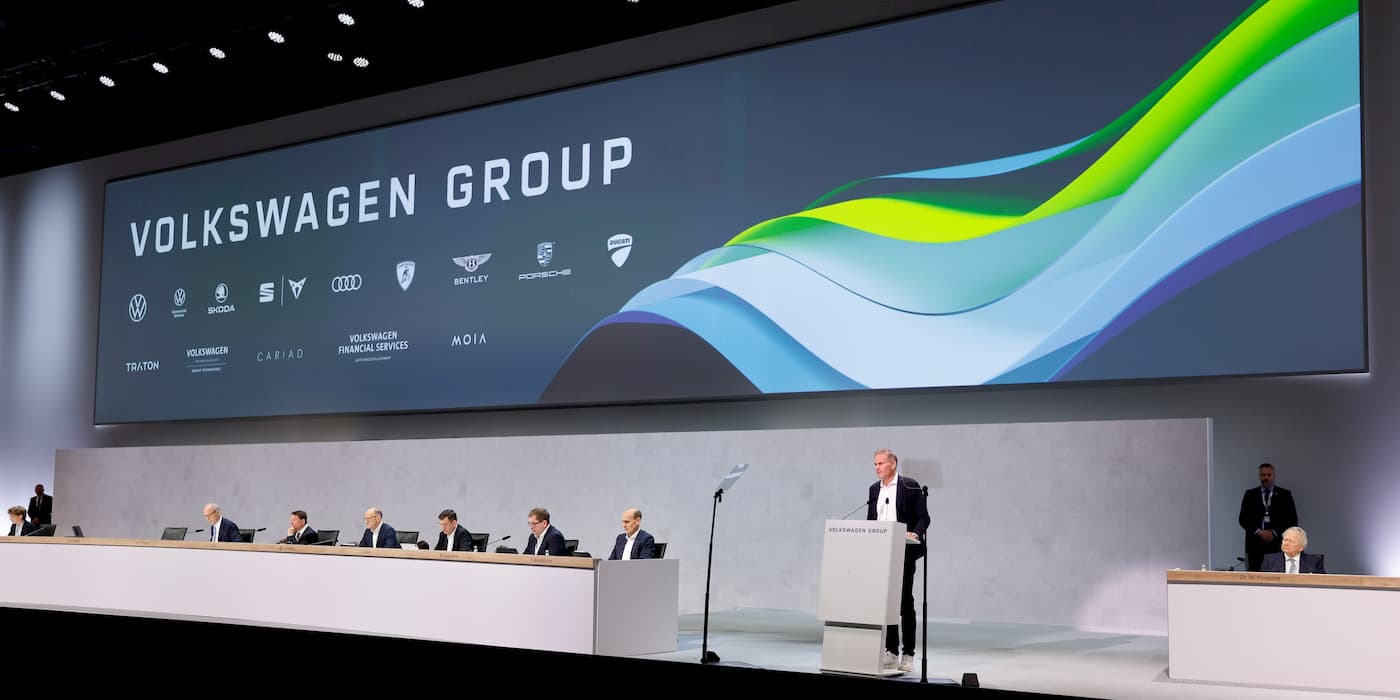
On Wednesday, several activist groups briefly interrupted Volkswagen’s annual general meeting. One claimed VW is “making climate-damaging decisions,” and the other says the automaker uses forced labor to build cars in China.
Cake was thrown from an unknown party, and investors raised concerns over VW losing ground in China to EVs.
Protests erupt at Volkswagen annual meeting
At Volkswagen’s annual general meeting in Berlin on Wednesday, around a dozen activists staged a protest, gluing themselves to the road to block traffic.
The activists argued VW was “making climate-damaging decisions” before the meeting was able to begin. Once the conference started, more protestors joined in, shouting accusations of forced labor in China and waving flags that said “End Uyghur Forced Labor,” according to Automotive News Europe.
Essentially, the disruptions stemmed from two things:
- Concerns over alleged forced labor at VW’s Facility in Xinjiang, China
- Volkswagen’s EV strategy and concerns that it’s losing ground in China
As for the forced labor allegations, VW Group China CEO, Ralf Brandstaetter, visited the SAIC Volkswagen-owned Xinjiang facility earlier this year, saying, “We do not see any evidence of human rights abuses at the plant.”
The topic became a discussion among investors, not just activists, urging VW to require SAIC to conduct an independent audit of the plant.
Protestors threw a cake at Volkswagen Chairman Hans Dieter Poetsch, which you can view below.
Investors concerned over VW losing ground in China to EVs
Volkswagen shareholders brought up the increasing competition from EV makers, like BYD and Tesla, in China.
Tesla delivered another record quarter, with over 422,000 vehicles in the first three months of 2023. Meanwhile, BYD continues to dominate the market in China, delivering over 264,000 all-electric vehicles in Q1, up 85% from last year.
Furthermore, BYD surpassed VW in passenger car sales in the first three months as demand for affordable EVs continues to build.
The market in China is quickly progressing toward being fully electric, with EVs accounting for one in every four vehicles sold in the region last year.
Once the dominant force in China, Volkswagen has watched its market share shrink over the years as domestic EV makers like NIO and XPeng gained customers.
Top comment by HH702
VW has a serious issue in China. It needs to get its localised software sorted out and get new models into the country. Having a year-long delay on the Q6 and Macan is a disaster given that those both would be important models to maintain Audi and Porsche customers in China. It is looking like Mercs strategy of giving up any mass market positions and moving more to premium/luxury is the right one in the face of Chinese dominance of mass market EVs.
Blume acknowledged the market in China was rapidly moving toward electric, outlining the automaker’s strategy to maintain its position. VW plans to create EVs designed for Chinese buyers by collaborating with local partners to win back market share.
Electrek’s take
After its overall sales fell 3.6% in the region in 2022, Volkswagen revealed plans last month to accelerate EV development by around 30% in China.
VW said it would invest EUR 1 billion to establish a new business and development center called “100%TechCo” in China. The project is designed to speed up development by integrating tech from local suppliers to produce vehicles with Chinese buyers in mind.
Brandstaetter said the new developments will “significantly accelerate our development pace.” However, will it be quick enough to keep up in an even faster-moving Chinese auto market? That’s what investors are concerned with.
FTC: We use income earning auto affiliate links. More.


Comments